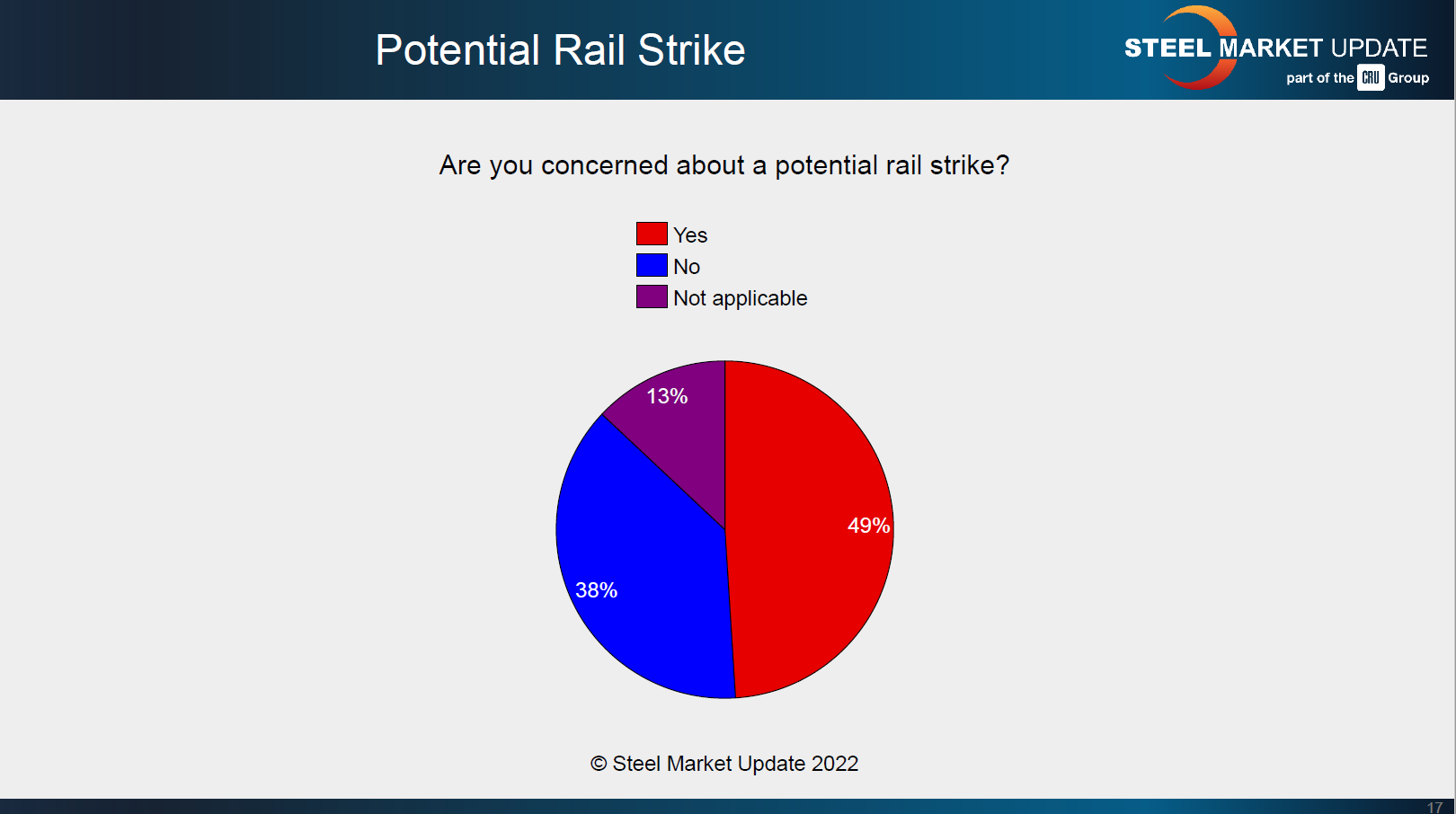Logistics

November 11, 2022
Steel Concerned as Rail Strike Potential Pushed to December
Written by Laura Miller
The potential for a rail strike in the US has been pushed back to early December. But concerns remain for the steel industry, which relies heavily on rail transportation.
![]()
After rejecting a proposed national labor contract in October and reigniting the possibility of a rail strike, the Brotherhood of Maintenance of Way Employees (BMWE) Division of the International Brotherhood of Teamsters has extended its status quo period from Nov. 20 until Dec. 9.
A status quo period allows for negotiations to continue after the expiration of a contract while the prior contract’s conditions are maintained.
The Brotherhood of Railroad Signalmen (BRS) was the second union to reject the national agreement, and its status quo period also goes until Dec. 9. The unions can choose to go on strike if an agreement hasn’t been reached by that date.
The BMWE decided to extend its status quo into December to allow two other rail unions — the Brotherhood of Locomotive Engineers and Trainmen (BLET) and the International Association of Sheet Metal, Air, Rail and Transportation Workers (SMART) — the opportunity to finish their own ratification procedures for the national agreements. The BLET and SMART are scheduled to hold their ratification votes on Nov. 21.
Should the BLET and SMART choose to reject the national agreement, the unions will have the chance to bring all the rail labor unions together to finish national negotiations under a single deadline.
Seven of the 12 rail unions have already ratified the tentative national agreement that was reached in September between the unions and the National Carriers’ Conference Committee (NCCC) of the National Railway Labor Conference (NRLC). The NCCC is made up of the chairman of the NRLC, senior labor relations executives of five of the US Class I railroads (BNSF, CSX, Kansas City Southern, Norfolk Southern, and Union Pacific), and senior labor relations leaders of the US railroads owned directly or indirectly by Canada National. The 12 unions involved in national bargaining collectively represent 115,000 employees.
The main sticking point for the BMWE and BRS is the issue of paid sick leave. The railroads continue to reject their proposals asking for it.
“There are reports indicating the railroads intend to begin ceasing various rail operations within the next few days, in anticipation of a strike on Nov. 20 … These service shutdowns would be a premature exercise of self-help by the railroads …[and] would also represent a blatant attempt to cause panic and economic harm to the railroads’ customers and the US economy right before the Thanksgiving holiday. They would also be a manipulative attempt to instigate Congress to intervene against the interests of railroad workers,” the BMWE said in a statement.
With the BMWE’s status quo extension, “there is absolutely no reason for the railroads to discontinue services,” the union said.
“This is the railroads’ last chance to do the right thing by voluntarily agreeing to provide paid sick leave to all employees. If the railroads fail to give up one penny of every dollar of profit for paid sick leave for their highly valued employees by Dec. 8th, and there is either a strike or lockout or both, then the railroads will be responsible for the imposition of a shutdown of their operations and the economic harms to its customers, the country’s economic supply chain, and the entire US economy,” the BMWE stated.
Steel Industry Concerned
Steel Market Update’s most recent survey results show nearly half of industry respondents are concerned about the potential for a strike:

Here’s what some of them had to say about it:
“The perfect storm with the diesel issue affecting trucks.”
“This could really put another constraint on our trucking!”
“We are watching it closely. … It could be a game changer.”
“It could impact deliveries as well as customer shipments.”
“We are concerned. This was supposedly put to bed, but in fact this is not the case. It would have a major impact.”
“It would halt our operations. … We would be shut down within two weeks.”
“I just don’t think it makes any sense for any of the parties to have a strike. I also assume the Biden administration will step up if needed.”
“Even though we get 95% of our material via rail, I do not believe a strike would last. The government will get involved.”
By Laura Miller, Laura@SteelMarketUpdate.com






